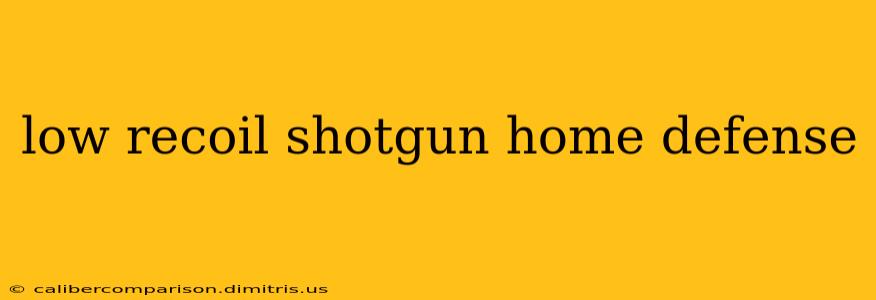Home defense is a serious matter, demanding careful consideration of every aspect of your preparedness. Choosing the right firearm is paramount, and for many, a shotgun offers a compelling combination of stopping power and manageable size. However, the significant recoil associated with many shotguns can be a major drawback, especially for those lacking extensive shooting experience. This article explores the best low-recoil shotguns ideal for home defense, focusing on features that minimize recoil while maximizing effectiveness.
Understanding Recoil and Its Impact on Home Defense
Recoil, the backward force felt after firing a shotgun, is influenced by several factors including the gauge (12 gauge, 20 gauge, etc.), the weight of the shotgun, the type of ammunition used, and the shooter's physique. High recoil can lead to several issues crucial in a home defense scenario:
- Reduced Accuracy: A powerful recoil can throw off your aim, making follow-up shots difficult or impossible. This is critical in a high-stress situation where multiple shots may be necessary.
- Increased Recovery Time: It takes longer to get back on target after a shot with high recoil, delaying your response to a threat.
- Bruising and Discomfort: Excessive recoil can cause bruising and discomfort, hindering your ability to effectively defend yourself.
Therefore, selecting a low-recoil shotgun mitigates these problems, increasing your chances of successfully neutralizing a threat.
Top Features to Look for in a Low-Recoil Home Defense Shotgun
Several features contribute to a shotgun's reduced recoil:
- Gauge: Lower gauges, such as 20 gauge and even .410 bore, produce significantly less recoil than 12 gauge shotguns. While 12 gauge offers more stopping power, the manageable recoil of smaller gauges is often a preferable trade-off for home defense.
- Weight: Heavier shotguns absorb recoil more effectively. Look for shotguns with substantial weight, even if it means sacrificing some maneuverability.
- Gas-Operated Systems: Gas-operated shotguns use a portion of the propellant gases to reduce recoil. These systems are smoother shooting and often more controllable than pump-action or break-action models.
- Recoil Pads: High-quality recoil pads absorb some of the backward force, reducing felt recoil. These are usually made of rubber or other shock-absorbing materials.
Recommended Low-Recoil Shotgun Options for Home Defense
While specific model recommendations are best left to firearm experts and individual research based on personal preferences and local regulations, several types of shotguns generally offer lower recoil characteristics:
- 20 Gauge Pump-Action Shotguns: These offer a good balance between stopping power and manageable recoil. Many manufacturers produce reliable and affordable options.
- Gas-Operated 12 Gauge Shotguns: While 12 gauge inherently produces more recoil, gas-operated systems significantly reduce the felt recoil, making them a viable choice for those prioritizing stopping power.
- .410 Bore Shotguns: These are the lowest recoil options but compromise stopping power. They are best suited for individuals with limited upper body strength or those prioritizing reduced noise and flash.
Ammunition Considerations
Choosing the right ammunition is just as crucial as choosing the right shotgun. Low-recoil ammunition is specifically designed to minimize recoil while maintaining effective stopping power. Research different types of reduced-recoil ammunition to find the best fit for your chosen shotgun.
Training and Practice: The Unsung Hero
No matter the shotgun you choose, proper training and regular practice are essential. Familiarize yourself with your weapon's operation, practice your shooting stance, and hone your skills to ensure you're prepared for any home defense situation. Consider professional training courses to learn advanced techniques and tactics.
Disclaimer: This article is for informational purposes only and should not be considered professional advice. Always consult with a qualified firearms expert and adhere to all local, state, and federal laws regarding firearm ownership and usage. The safety and responsible use of firearms are paramount.

